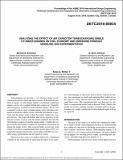Analyzing the Effect of Air Capacitor Turbocharging Single Cylinder Engines on Fuel Economy and Emissions Through Modeling and Experimentation
Author(s)
Buchman, Michael R.; Johnson, William Brett; Winter, Amos G.
Downloadv003t01a043-detc2018-85934.pdf (4.451Mb)
PUBLISHER_POLICY
Publisher Policy
Article is made available in accordance with the publisher's policy and may be subject to US copyright law. Please refer to the publisher's site for terms of use.
Terms of use
Metadata
Show full item recordAbstract
Turbocharging can provide a cost effective means for increasing the power output and fuel economy of an internal combustion engine. A turbocharger added to an internal combustion engine consists of a coupled turbine and compressor. Currently, turbocharging is common in multi-cylinder engines, but it is not commonly used on single-cylinder engines due to the phase mismatch between the exhaust stroke (when the turbocharger is powered) and the intake stroke (when the engine intakes the compressed air). The proposed method adds an air capacitor, an additional volume in series with the intake manifold, between the turbocharger compressor and the engine intake, to buffer the output from the turbocharger compressor and deliver pressurized air during the intake stroke. This research builds on previous work where it was shown experimentally that a power gain of 29% was achievable and that analytically a power gain of 40-60% was possible using a turbocharger and air capacitor system. The goal of this study is to further analyze the commercial viability of this technology by analyzing the effect of air capacitor turbocharging on emissions, fuel economy, and power density. An experiment was built and conducted that looked at how air capacitor sizing affected emissions, fuel economy, and the equivalence ratio. The experimental data was then used to calibrate a computational model built in Ricardo Wave. Finally this model was used to evaluate strategies to further improve the performance of a single cylinder diesel turbocharged engine with an air capacitor.
Date issued
2018-08Department
MIT-SUTD Collaboration; Massachusetts Institute of Technology. Department of Mechanical EngineeringJournal
Volume 3: 20th International Conference on Advanced Vehicle Technologies; 15th International Conference on Design Education
Publisher
American Society of Mechanical Engineers
Citation
Buchman, Michael R., W. Brett Johnson, and Amos G. Winter. “Analyzing the Effect of Air Capacitor Turbocharging Single Cylinder Engines on Fuel Economy and Emissions Through Modeling and Experimentation.” Volume 3: 20th International Conference on Advanced Vehicle Technologies; 15th International Conference on Design Education (August 26, 2018).
Version: Final published version
ISBN
978-0-7918-5178-4